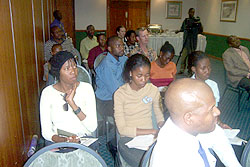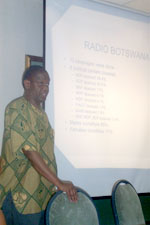1 February 2005
MediaNews 16 - February 2005
Botswana's media during election time: barely one article a day
Monitoring
By Romang Lephothoe
MISA Botswana embarked on a three-months Media Monitoring Project on elections for the first time. The aim of the project was to examine how elections were reported in the local media, including the political and gender balance of such reporting, as well as to raise public awareness of election reporting. | The eight monitored newspapers: Mmegi, Botswana Guardian, Botswana Gazette, Mokgosi, Midweek Sun, The Voice, Daily News and MmegiMonitor. Plus three radio stations: Radio Botswana, Gabz FM 96.2 and Yarona FM 106.6, as well as Botswana’s only television station: Botswana Television. |
MISA Botswana had long wanted to monitor local media especially during General Elections, in particular to verify accusations of media bias during such times. This was our first opportunity to do this.
The project was meant to start data collection at the beginning of September and run for three months so that post-election reporting could also be covered. However, delays in funding meant that it only went into action on the 17th of September. The study took place up until November 2004.
 | | Presentation of the monitoring project |
Attending the launch in Gaborone on 19 October 2004 was a diverse crowd of journalists, political representatives and people working for donor organisations such as EU, embassies, UNDP and Non Governmental Organisations such as.
Little coverage
The initial findings presented at the launch were challenging for a number of reasons. For one, there were not many articles to analyse. In the month preceding the official launch only 278 items were recorded across all monitored media; an average of less than one article per outlet per day, despite the fact that elections were looming.
Secondly, the coverage was not even across all parties, with just two parties hoarding the majority of coverage. Botswana Democracy Party (BDP) had 41% and the Botswana Congress Party (BCP) had 28.8%. BDP is the ruling party while BCP and Botswana National Front (BNF) are the main opposition parties.
The third conclusion is that women candidates received very little coverage at all; approximately 10% of the total.
Bias
The launch was greeted positively, though questions were raised regarding how items were recorded. Some political parties pointed out that whilst a party might receive a lot of coverage in terms of percentage, some stories covered were on a negative note. It was suggested that article bias should also be measured so that a better picture of media coverage could be developed.
 | | Presentation of the monitoring project |
Some discussion followed the presentation of the results, centring on how to improve election reporting in the country. Some journalists raised concern over political parties. These are supposedly not being sufficiently proactive in securing press coverage of their events. It was said that some political parties do not invite journalists or even open up to answer their questions.
For example the Botswana Television journalist told the audience that political parties activities organisation tends to be clustered most of the time. Their events often take place on the same day, at same time and it is difficult for one television station to divide itself to grasp the activities of all political parties.
Political colouring
Mr Themba Joina leader of the opposition party MELS complained that journalists often allowed their own political bias to colour their reporting. There has been a complaint lodged to the Press Council of Botswana by the BNF, another opposition party. The complaint concerns an editor of the leading newspaper in the country who was involved in a private publishing house as a shareholder; the said publishing house had also been engaged by the ruling party BDP to help with the party’s advertising campaign.
This strongly suggests that there is a conflict of interest. It, according to the complainant, looked like the editor and his newspaper tend to be politically biased in their reportage regarding issues affecting the BDP.
This project was set up by MISA Botswana, with funding being provided by the Netherlands Institute for Southern Africa (NiZA). MISA Botswana is in the process of finalising a report of election monitoring. The author of this article Romang Lephothoe, Advocacy Officer, has been with the Media Institute of Southern Africa Botswana Chapter for four years now. director@bw.misa.org
|

